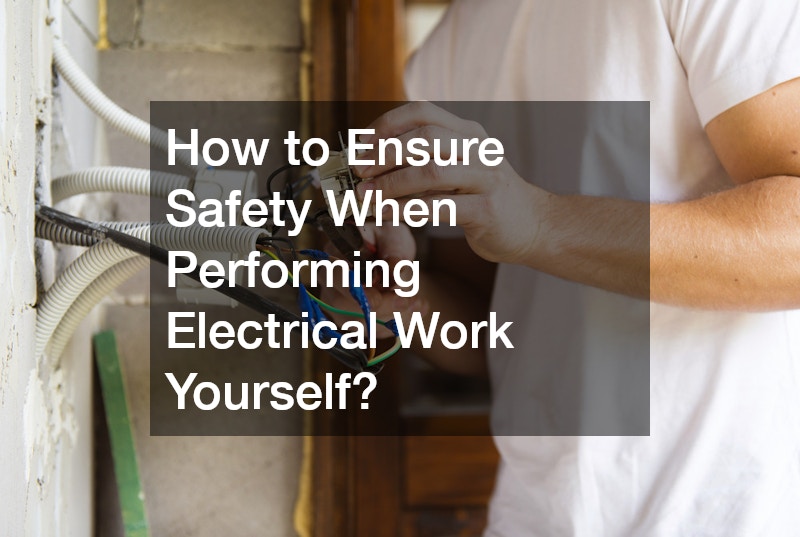Understanding when to call a professional for electrical work and when you can safely perform electrical tasks yourself is critical for maintaining home safety and efficiency. Many homeowners are eager to take on DIY electrical projects, but not every task is suitable for a non-professional. By examining the risks, assessing your skills, and understanding local regulations, you can make informed decisions. This article will guide you through the process, highlighting when it is safe to perform electrical work yourself and when hiring a certified electrician is the smarter choice.
What Are the Risks of Performing Electrical Work Yourself?
Safety Hazards
Electrical work is inherently dangerous. Even seemingly minor tasks, such as replacing a switch or outlet, can result in electric shocks, burns, or fire if not handled correctly. Certified electricians receive extensive training to safely manage high-voltage circuits and complex wiring systems. Attempting to perform electrical tasks without proper knowledge can put you and your family at risk.
Legal and Code Compliance Risks
Electrical projects must comply with local and national building codes. Performing work that violates these codes can lead to fines, insurance issues, and costly corrections. Electrical contractors and the best electricians understand the regulatory requirements, ensuring every installation—from home generators to central air installation—is both safe and legal.
Risk of Poor Workmanship
DIY electrical work may appear functional but often lacks long-term reliability. Poorly executed wiring can cause flickering lights, frequent breaker trips, or damage to appliances. Appliance repair technicians often encounter problems stemming from substandard DIY installations, reinforcing the importance of hiring experienced professionals for complex projects.
Financial Implications of Mistakes
Errors in electrical work can be expensive. A simple wiring mistake can damage home generators, central air units, or HVAC systems, requiring costly electrical repair. The upfront cost of hiring a certified electrician may seem high, but it often saves money in the long run by preventing accidents and ensuring systems operate efficiently.
When to Prioritize Calling a Professional
If your project involves high-voltage circuits, electrical panel upgrades, or furnace repairs, hiring a professional is non-negotiable. Electrical contractors and generator installers have the experience and tools necessary to handle these tasks safely. Attempting to perform electrical work in these areas without expertise can be dangerous and expensive.
How to Determine If You Have the Necessary Skills?

Assessing Your Own Experience
Before attempting any DIY electrical work, assess your experience honestly. Have you successfully completed minor repairs or installations before, or are you unfamiliar with basic electrical systems? Even those who perform electrical tasks occasionally must recognize when a project exceeds their skill level.
Understanding Basic Electrical Concepts
A foundational understanding of electricity is essential. Knowledge of circuits, voltage, amperage, and grounding ensures safe handling of wires and devices. Homeowners who perform electrical tasks without understanding these concepts risk serious injury and damage to electrical systems.
Tools Required for DIY Electrical Work
Having the right tools is crucial. Insulated screwdrivers, wire strippers, multimeters, and protective gloves are the minimum for safe DIY projects. Certified electricians and appliance repair technicians use specialized equipment to ensure accuracy and safety in every installation.
Resources for Learning Electrical Skills
Online tutorials, instructional videos, and DIY manuals can teach homeowners to perform electrical tasks safely. While these resources are useful for simple projects like installing dimmers or replacing outlets, complex systems like furnace repairs or central air installation require professional knowledge.
Gauging the Complexity of the Project
Assessing complexity helps determine whether you should perform electrical work yourself or hire a professional. Tasks like minor appliance repairs are generally safe, but wiring, panel upgrades, and high-voltage work demand certified electricians or electrical contractors.
What Electrical Jobs Can Typically Be Done Without a Professional?
Replacing Light Fixtures
Replacing light fixtures is often manageable for homeowners. With the power off and proper precautions, you can remove the old fixture and install a new one. This task allows you to perform electrical work safely while updating your home’s lighting aesthetics.
Installing a Ceiling Fan
Ceiling fan installation requires both electrical knowledge and mechanical skills. When performed correctly, it improves comfort and energy efficiency. Homeowners who feel confident can perform electrical work on these installations by following manufacturer’s instructions carefully.
Replacing Switches and Outlets
Replacing switches and outlets is a common DIY task. Shutting off the circuit, testing voltage, and connecting wires properly ensures safety. Homeowners performing electric tasks at this level gain confidence while minimizing risk.
Minor Appliance Repairs
Minor appliance repairs, such as replacing a cord or fixing a loose connection, can often be done safely by homeowners. Appliance repair technicians advise that more complicated appliance repairs, particularly those involving HVAC units or home generators, should be left to professionals.
Installing Dimmers
Installing dimmer switches enhances lighting control and energy efficiency. Following wiring diagrams and manufacturer instructions allows homeowners to safely perform electrical work without professional assistance, provided proper precautions are observed.
When Is It Absolutely Necessary to Hire a Professional?

Wiring and Rewiring Homes
Wiring a home or extensive rewiring is a job for certified electricians. Mistakes can result in fires, shocks, or long-term damage. Electrical contractors ensure safe, code-compliant installations that protect both your home and appliances.
Circuit Breaker Upgrades
Upgrading circuit breakers involves handling high-voltage components. Only a certified electrician or electrical contractor should perform this work. Improper installation can compromise home safety and lead to costly repairs.
Electrical Panel Work
Electrical panel work is critical to the safety of your home. Certified electricians handle panel upgrades, replacements, and load calculations accurately. Attempting to perform electrical work on panels without training is highly dangerous.
Code Compliance and Inspections
Hiring professionals ensures compliance with local codes and inspection requirements. Projects like central air installation, furnace repairs, and home generators often require inspections that only licensed electricians can navigate effectively.
Emergency Electrical Repairs
Emergency situations, such as sparking outlets or sudden power loss, demand prompt professional attention. HVAC companies, certified electricians, and electrical contractors can perform electrical repairs quickly and safely, preventing further damage. When it comes to complex heating and cooling systems, calling a certified HVAC company is essential. These professionals have the training and experience to handle central air installation, furnace repairs, and other high-voltage components safely. Attempting to perform electric work on HVAC systems without proper knowledge can lead to costly damage, safety hazards, and system inefficiency. By relying on a licensed HVAC company, homeowners can ensure that all repairs and installations are done correctly, meeting code requirements and maintaining optimal performance.
How Do Local Regulations Impact DIY Electrical Projects?
Understanding Your Local Building Codes
Local codes regulate safe electrical installation practices. Electrical contractors and the best electricians know these codes and ensure compliance. Homeowners performing electric work must familiarize themselves with relevant regulations to avoid hazards and legal issues.
Permit Requirements for Electrical Work
Many electrical projects require permits. Failure to obtain proper permits can result in fines and complications during home sales. Professionals help secure permits for projects like central air installation, furnace repairs, or home generators.
Consequences of Non-Compliance
Non-compliance can compromise safety, void insurance, and result in costly retrofits. Licensed electricians ensure that all work meets code requirements, protecting both property and residents.
Professional Licensing Requirements
Licensed electricians, appliance repair technicians, and generator installers meet rigorous training and licensing standards. Homeowners performing electric tasks on complex projects should always consider the expertise of licensed professionals.
Inspection Processes and Importance
Inspections confirm that work meets safety and code requirements. Electrical contractors routinely handle inspections, ensuring projects like furnace repairs or central air installation pass without issue. DIY work may fail inspections, leading to delays or additional costs.
How to Ensure Safety When Performing Electrical Work Yourself?

Importance of Turning Off Power
Turning off the power at the breaker before performing electrical tasks is essential. Confirming circuits are de-energized with a voltage tester prevents shocks and ensures safety for small DIY projects.
Using Protective Equipment
Insulated gloves, goggles, and proper footwear protect against electrical hazards. Homeowners performing electric work should adopt the same safety practices as appliance repair technicians and certified electricians.
Double-Checking Work Methods
Following wiring diagrams and manufacturer instructions carefully reduces the risk of errors. Verifying connections and methods ensures DIY projects are safe and functional.
Safe Handling of Tools
Using insulated and well-maintained tools is critical. Damaged or inappropriate tools increase the risk of injury. Certified electricians rely on proper equipment to perform electrical work efficiently and safely.
Recognizing When You’re Out of Your Depth
Knowing when a project exceeds your skill level is key. High-voltage wiring, panel upgrades, and home generator installations should always be performed by professionals. Safety comes first when deciding whether to perform electrical work yourself.
What Tools and Materials Are Essential for DIY Electrical Tasks?
Basic Electrical Tools
Screwdrivers, wire strippers, pliers, voltage testers, and multimeters are essential for safe DIY work. These tools enable homeowners to perform electrical tasks such as installing switches, outlets, and dimmers effectively.
Safety Equipment
Insulated gloves, protective eyewear, and non-slip footwear reduce injury risks. Even minor electrical repairs require proper safety precautions to avoid hazards.
Quality of Materials
Using high-quality wires, switches, and outlets ensures durability and safety. Low-grade materials can cause electrical failures and costly repairs.
Where to Source Tools and Materials
Hardware stores, online suppliers, and specialized electrical supply houses provide quality tools and materials. Professionals like appliance repair technicians and generator installers rely on reputable sources to perform electrical work correctly.
Maintenance of Tools
Regular inspection, cleaning, and replacement of worn tools ensures safety and efficiency. Well-maintained tools allow homeowners to perform electrical tasks accurately without risk.
How to Troubleshoot Common Electrical Problems?
Diagnosing Power Outages
Power outages often result from tripped breakers or faulty circuits. Homeowners can perform electrical troubleshooting for minor outages safely by checking breakers and ensuring proper connections.
Fixing Flickering Lights
Flickering lights may indicate loose connections or circuit issues. Performing electric diagnostics carefully can resolve these problems, though persistent issues require professional intervention.
Resolving Outlet Issues
Loose or damaged outlets can affect appliance function. Performing electric work on outlets safely involves inspecting wiring, tightening connections, and replacing faulty components.
Basic Circuit Troubleshooting
Understanding circuit layouts and using multimeters helps identify minor faults. Appliance repair technicians frequently assist homeowners in performing electrical troubleshooting effectively.
When Troubleshooting Fails, Call a Professional
If problems persist, contact a certified electrician. Attempting advanced repairs without proper training risks injury, damage to home generators, or other electrical systems.
How to Estimate Time and Cost for DIY Electrical Projects?

Evaluating Project Scope
Assess the size and complexity of a project before starting. Small tasks like installing dimmers or replacing switches can be performed quickly, while home generator installations or central air installation require professional time.
Budgeting for Materials and Tools
Estimate costs for materials and tools to avoid overspending. DIY projects can save money, but may require investing in proper equipment to safely perform electrical work.
Time Management Strategies
Plan carefully, accounting for unforeseen challenges. Adequate time ensures safety and prevents rushed mistakes when performing electrical tasks.
Cost Comparison With Hiring a Professional
Compare total DIY costs with hiring the best electricians. Professionals may have higher upfront costs but provide long-term savings by performing electric work efficiently and safely.
Learning From Past Projects
Evaluating past DIY work improves skill and efficiency. Recognizing which tasks you can safely perform electrical work on helps prevent mistakes and ensures project success.
How to Find and Select a Qualified Electrical Professional?
Research Methods for Finding Electricians
Start with referrals, online reviews, and local listings. Electrical contractors, certified electricians, and HVAC companies can provide expertise for furnace repairs, central air installation, or home generator projects.
Qualifications and Certifications to Look For
Ensure the professional is licensed and certified. Certified electricians have the experience to perform electrical work safely and in compliance with regulations. Verifying credentials and asking for proof of certification helps guarantee you hire a qualified and trustworthy professional.
Questions to Ask Before Hiring
Ask about experience, project history, insurance, and guarantees. Knowing a professional’s capabilities ensures they are suited for tasks like electrical repair or appliance servicing.
Checking References and Reviews
Review past customer experiences to evaluate reliability and quality. Reputable professionals consistently perform electrical work to high standards. Review past customer experiences to evaluate reliability and quality. Reputable professionals consistently perform electrical work to high standards. Checking for repeat clients and long-term projects can also indicate a professional’s trustworthiness and consistency.
Understanding Quotes and Contracts
Obtain detailed quotes outlining labor, materials, timelines, and warranties. Clear contracts ensure projects like furnace repairs or home generator installations proceed smoothly.
Navigating electrical projects requires skill, caution, and a clear understanding of your limits. While minor tasks such as replacing light fixtures or installing dimmers can allow homeowners to perform electrical work safely, larger projects—such as electrical panel upgrades, furnace repairs, or home generator installations—require certified electricians or electrical contractors. By assessing your experience, following safety guidelines, and knowing when to call in professionals, you can ensure the safety, efficiency, and reliability of your home’s electrical systems. Prioritizing expertise and caution helps prevent accidents, code violations, and costly repairs.


